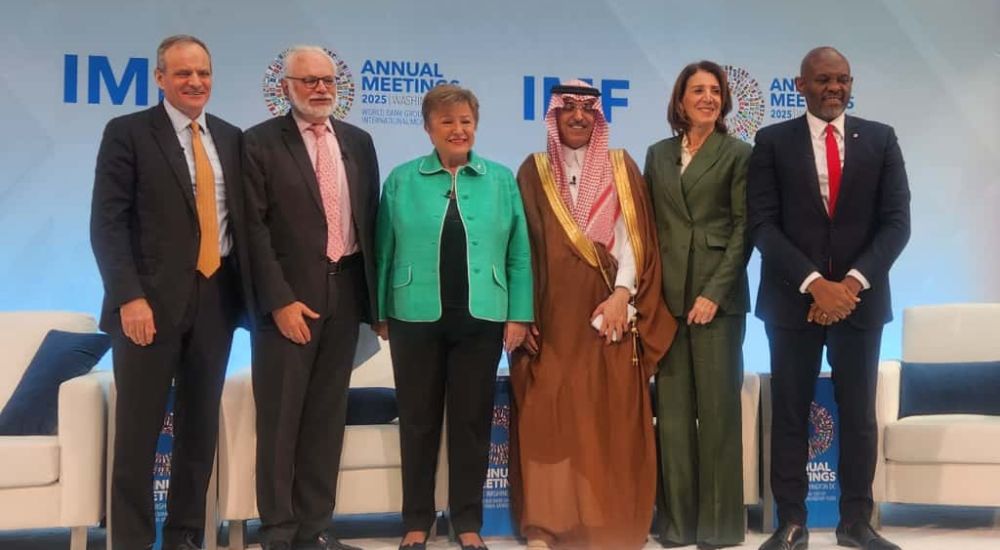IMF Warns Of Widening Inequality If Digital Infrastructure Gaps Persist In Developing Nations

…Digital Transformation Must Democratize Prosperity, Says Tony
Washington, DC – The International Monetary Fund (IMF) has warned that the failure to bridge digital infrastructure gaps in developing nations could worsen inequality and slow global productivity growth, even as advanced economies reap the benefits of artificial intelligence (AI) and emerging technologies.
This was the highpoint of a high-level panel session on “Boosting Productivity Growth in the Digital Age” during the 2025 IMF/World Bank Annual Meetings in Washington DC, attended by global leaders, including Kristalina Georgieva, Managing Director, IMF; Mohammed Al-Jadaan, Minister of Finance, Kingdom of Saudi Arabia; Tony Elumelu, Founder and Chairman, Heirs Holdings; Simon Johnson; Ronald Kurtz, Professor of Entrepreneurship, MIT Sloan School of Management; and Ruth Porat, President and Chief Investment Officer, Alphabet and Google.
The panellists emphasised the need for inclusive technological advancement to ensure that AI-driven prosperity benefits all nations, not just a few.
Speaking during the session on Wednesday, IMF Managing Director Kristalina Georgieva expressed optimism about the transformative potential of technology but cautioned that uneven adoption could deepen existing economic disparities.
She noted that global growth remains subdued, with the IMF projecting medium-term output at around three per cent, significantly lower than the pre-pandemic average of 3.7 per cent.
Advertisement
According to her, more than half of the slowdown is linked to weak productivity growth, a problem that can only be reversed by harnessing innovation and digital transformation.
“If we want vibrant economies that deliver for people, we must unlock productivity growth,” Georgieva said. “Innovation must move from discovery to business to scale, and this requires strong digital foundations, especially in developing countries.”
The IMF chief pointed to the United States as an example of an innovation-driven economy where technological progress has rapidly translated into productivity gains.
She said the Fund’s analysis suggests that AI could lift global growth between 0.1 and 0.8 percentage points, a potentially transformative effect if adopted inclusively.
However, she warned that without deliberate policies to expand access to digital infrastructure and education, AI could become a source of “divergence rather than convergence,” creating a world where technological advancement benefits a few nations while leaving others behind.
Advertisement
Georgieva said the IMF recognises both the promise and the peril of AI adoption.
While the technology could transform industries, enhance service delivery, and raise productivity, she noted that it also poses significant risks, particularly for countries without the infrastructure or skills to participate fully.
She warned that if the digital divide persists, countries that fail to invest in broadband access, education, and innovation systems could see their economies lag even further behind.
“The question is not whether AI will change the world; it already is. The question is whether this transformation will lead to greater convergence or deeper divergence,” she said.
Also, Elumelu, who served as a panellist, called for urgent and coordinated global investment in Africa’s digital and physical infrastructure to enable inclusive participation in the emerging digital economy.
Elumelu, who is also the founder of the Tony Elumelu Foundation, stressed that the digital age must not merely increase efficiency but must also “democratise prosperity”.
Advertisement
“Productivity is not just about output per worker; it is about opportunity per person. Africa’s youth are eager, creative, and ambitious but constrained by weak infrastructure, limited access to capital, and unreliable electricity. Without addressing these barriers, we risk a future where technology amplifies inequality instead of reducing it.”
He identified access to affordable electricity as a critical foundation for digital progress, emphasising that artificial intelligence and related innovations depend heavily on a stable power supply and broadband connectivity.
He added, “Access to electricity is vital for the advancement of AI and the productivity that comes with it. We need deliberate, large-scale investments in digital infrastructure and AI capabilities across Africa.”
The Nigerian investor noted that despite structural limitations, Africa had demonstrated its capacity for innovation, citing the mobile money revolution as an example of how entrepreneurs can create transformative solutions even in difficult environments.
He said, “Mobile money revolutionised financial inclusion on the continent, not because our systems were perfect, but because entrepreneurs innovated around the constraints.
“That same entrepreneurial spirit can help Africa leapfrog again this time through AI if we have the right support from governments, private investors, and development partners.”
Elumelu also highlighted ongoing partnerships between his foundation and global technology companies like Google to support young African entrepreneurs.
He said such collaborations demonstrate that inclusive innovation is achievable when resources and expertise are pooled to address local challenges.
“Through the Tony Elumelu Foundation and Google, we’ve worked to equip thousands of young African entrepreneurs with digital tools and training. By supporting this generation, we are not only improving productivity but also building a future that is more equitable and globally competitive.” He added.
He urged institutions such as the IMF, the World Bank, and major tech firms to create frameworks that ensure emerging technologies, including AI, work for all humanity.
“We must ensure that AI-driven efficiency and productivity help democratize prosperity—not concentrate it. This requires a coalition of governments, global institutions, and the private sector working together with a shared vision,” he said.
Elumelu concluded with a call to action for policymakers and development partners.
“Africa does not need sympathy; we need systems that work. We have the talent, energy, and creativity. What we need are functional structures such as power, infrastructure, and capital that allow our people to compete globally in this digital age,” he added.
